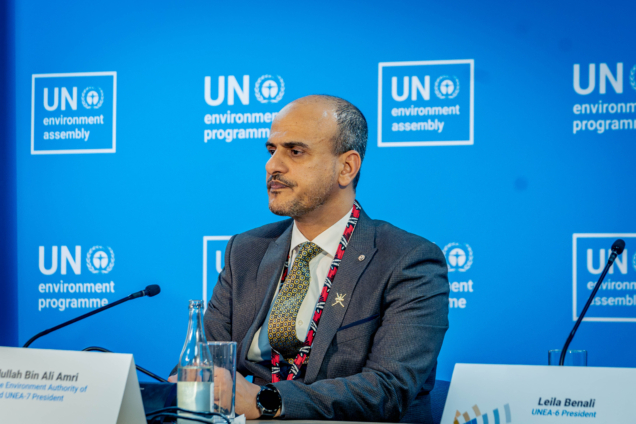Chairman of the Environment Authority of Oman Abdullah Bin Ali Amri has been elected as the new president to oversee UNEA-7, scheduled for December 8-12, 2025.
Mr Amri takes over from the President of UNEA-6 and the Minister of Energy Transition and Sustainable Development of Morocco, Leila Benali, who concluded the session by gaveling 15 resolutions and two decisions addressing critical aspects of the triple planetary crisis.
With the upcoming UN Environmental Assembly, Mr Abdullah will guide world leaders through further discussions and negotiations to address the world's most urgent issues.
Abdullah Bin Ali Amri emphasised that in the global endeavor to tackle monumental environmental challenges—climate change, biodiversity loss, and pollution—collaboration is the only way forward.
"We share one earth, bask under the same sun, and we must recognize that there is no backup plan. There's no other planet waiting for us to escape to," he indicated.
He emphasised the urgent need for global unity and determination to protect the planet and preserve its natural beauty.
"Together, let's embark on this crucial journey to secure a sustainable future for generations to come,” Abdullah urged, concluding his speech with a plea for peace on and for the planet.
Data from the 2024 Global Resource Outlook, unveiled at UNEA, cautioned that without immediate and concerted efforts to curb global consumption and production, natural resource extraction could surge by 60 percent from 2020 levels, exacerbating climate damage and posing increased risks to biodiversity and human health.
Additionally, the Global Waste Management Outlook 2024 revealed that without a fundamental shift away from linear "take-make-dispose" models towards circular economy practices and zero-waste strategies, the world's waste volume could expand by two-thirds by 2050, potentially doubling its detrimental effects on health, economies, and the environment.
Moreover, a UNEP report on Used Heavy Duty Vehicles and the Environment, introduced during a Climate and Clean Air Conference held in Nairobi prior to UNEA, raised concerns about the escalating emissions from these significant polluters and their adverse impacts on climate and public health.
More than 5,600 participants from 190 countries convened for the week-long UNEA-6 Assembly at the UNEP headquarters in Nairobi, Kenya, with a focus on addressing climate change, biodiversity loss, and pollution through effective multilateral actions.
The resolutions passed during UNEA-6 addressed various issues including the management of metals, mineral resources, chemicals, and waste, environmental assistance in conflict areas, water resource management, sustainable lifestyles, and land and water rehabilitation.
The assembly also featured the inaugural Multilateral Environmental Agreements (MEA) Day, highlighting the significance of international agreements in addressing global environmental challenges. Additionally, a youth-led environmental summit emphasized the importance of inter-generational equity.
On the closing day, a Ministerial Declaration affirmed Member States' commitment to combat climate change, protect biodiversity, eliminate pollution, and address issues like desertification and deforestation through sustainable multilateral actions.
UNEA-6 President Leila Benali described the event as a successful platform for advancing the human right to a clean, healthy, and sustainable environment worldwide.
“We have agreed on 15 resolutions, two decisions and a ministerial declaration,” she indicated.
She emphasized the need for enhanced partnerships with key stakeholders to implement the mandates, including continued collaboration with civil society to empower youth and engage creative minds. Additionally, partnerships with the private sector and philanthropic organizations were highlighted as crucial for advancing environmental goals.
UNEP's Executive Director, Inger Andersen, acknowledged the resolutions passed by the president, which covered areas such as desertification, land restoration, and a ministerial declaration reaffirming the international community's commitment to addressing climate change, restoring nature, and combating pollution.
Latest Stories
-
Paris 2024: Opening ceremony showcases grandiose celebration of French culture and diversity
3 hours -
How decline of Indian vultures led to 500,000 human deaths
3 hours -
Paris 2024: Ghana rocks ‘fabulous fugu’ at olympics opening ceremony
4 hours -
Trust Hospital faces financial strain with rising debt levels – Auditor-General’s report
4 hours -
Electrochem lease: Allocate portions of land to Songor people – Resident demand
5 hours -
82 widows receive financial aid from Chayil Foundation
5 hours -
The silent struggles: Female journalists grapple with Ghana’s high cost of living
5 hours -
BoG yet to make any payment to Service Ghana Auto Group
5 hours -
‘Crushed Young’: The Multimedia Group, JL Properties surprise accident victim’s family with fully-furnished apartment
5 hours -
Asante Kotoko needs structure that would outlive any administration – Opoku Nti
6 hours -
JoyNews exposé on Customs officials demanding bribes airs on July 29
6 hours -
JoyNews Impact Maker Awardee ships first consignment of honey from Kwahu Afram Plains
7 hours -
Joint committee under fire over report on salt mining lease granted Electrochem
8 hours -
Life Lounge with Edem Knight-Tay: Don’t be beaten the third time
8 hours -
Pro-NPP group launched to help ‘Break the 8’
8 hours

